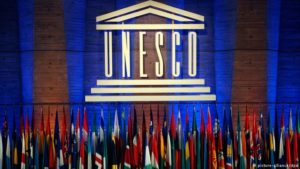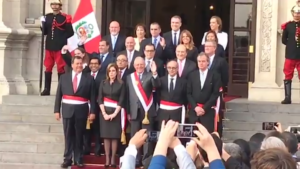Categoría: Política
Dramático Escape: Soldado Nor-Coreano deserta hacia Corea del Sur y sobrevive
Este es uno de los lugares mas fuertemente resguardados en el mundo, y en el vehículo se encuentra un soldado Nor-Coreano a punto de realizar la mas atrevida y peligrosa decisión de su vida: Desertar al Sur.
En las imágenes, el soldado continua su rumbo y pasa de largo el ultimo puesto de vigilancia Nor-Coreano, y sigue manejando. Sin vuelta atrás, el soldado esta a muy poca distancia de la libertad.
Los soldados del régimen Nor-Coreano toman una ultima decisión para atraparlo, y a solo unos metros de la linea demarcatoria sucede el desastre cuando el desertor choca su Jeep.
El soldado tiene que cruzar a pie con sus perseguidores disparando 40 balas a sus espaldas. Un soldado Nor-Coreano inclusive cruzó la frontera antes de que todos sus compañeros retrocedan, una clara violación al acuerdo de armisticio.
Media hora después, el soldado malherido es captado por las cámaras sobre una capa de hojas. Las imágenes de la cámara infrarroja muestran como los soldados Sur-Coreanos gatean para rescatarlo. Los doctores señalaron que el soldado se encuentra en recuperación.
Traducción al español: arturodiazf
Fuente: DW
System Of A Down – Psycho, Chop Suey! and la isla bonita live @ Rock Am Ring 2002
Estados Unidos anuncia su salida de la Unesco
Estados Unidos anunció su retiro de la Organización de Naciones Unidas para la Educación, la Ciencia y la Cultura (Unesco, por sus siglas en inglés).
La medida, que fue comunicada este jueves a la directora general de la organización, Irinia Bukova, se hará efectiva a partir del 31 de diciembre.
Según el Departamento de Estado estadounidense, la intención de EE.UU. es establecerse como “observador permanente” de Unesco.
Mayor información en: bbc
Read more at: reuters
10 de Octubre 2017: Declaran jornada no laborable para los trabajadores del sector público a nivel nacional

Imagen: https://1.bp.blogspot.com/-apdTNWpiq6w/T8uQqyFUxDI/AAAAAAAACZY/HC4LNCCqr_U/s640/peru-vs-colombia-eliminatorias-2012.jpg
Declaran jornada no laborable para los
trabajadores del sector público a nivel
nacional
DECRETO SUPREMO Nº 018-2017-TR
EL PRESIDENTE DE LA REPÚBLICA
CONSIDERANDO:
Que, de conformidad con el artículo 163 de la Constitución Política del Perú es obligación del Estado garantizar la seguridad ciudadana y el orden interno;
Que, el día 10 de octubre de 2017 se desarrollará un partido de futbol por la última fecha de las Eliminatorias al Campeonato Mundial de Fútbol Rusia 2018;
Que, dicho evento deportivo ha acaparado la total atención de la sociedad peruana en conjunto por lo que la Policía Nacional del Perú, en coordinación con las autoridades regionales, se encuentra adoptando medidas de seguridad a efectos de mantener el orden y la seguridad ciudadana, a nivel nacional;
Que, en ese sentido, resulta necesario declarar jornada no laborable sujeta a compensación, a nivel nacional, las horas próximas a la realización del referido partido de fútbol a fin de facilitar la implementación de las medidas de seguridad antes señaladas;
En uso de las facultades conferidas por el numeral 8) del artículo 118 de la Constitución Política del Perú;
DECRETA:
Artículo 1.- Jornada no laborable
Declárase jornada no laborable a nivel nacional, para los trabajadores del sector público, desde las 16:00 horas hasta las 23:59 horas del día 10 de octubre de 2017.
Para los fines tributarios, dichas horas serán consideradas hábiles.
Artículo 2.- Compensación de horas
Las horas dejadas de laborar por los trabajadores del sector público, según su jornada laboral, serán compensadas en la semana posterior o en la oportunidad que establezca el Titular de cada entidad pública, en función a sus propias necesidades.
La recuperación de horas se sujeta a parámetros de razonabilidad y no afecta el descanso semanal obligatorio del trabajador. En ningún caso, el tiempo de trabajo que comprende la recuperación de horas podrá ser mayor al periodo dejado de laborar.
Artículo 3.- Servicios indispensables y atención al público
Sin perjuicio de lo establecido en los artículos precedentes, los titulares de las entidades del sector público adoptan las medidas necesarias para garantizar a la comunidad, durante las horas no laborables establecidas en el presente decreto supremo, la provisión de aquellos servicios que resultan indispensables.
Artículo 4.- Jornada no laborable en el sector privado
Los centros de trabajo del sector privado podrán acogerse a lo dispuesto en el presente decreto supremo previo acuerdo entre el empleador y sus trabajadores, quienes deberán establecer la forma cómo se hará efectiva la recuperación de las horas dejadas de laborar; a falta de acuerdo decidirá el empleador.
Artículo 5.- Refrendo
El presente decreto supremo será refrendado por la Presidenta del Consejo de Ministros, el Ministro del Interior y el Ministro de Trabajo y Promoción del Empleo.
Dado en la Casa de Gobierno, en Lima, a los nueve
días del mes de octubre del año dos mil diecisiete.
PEDRO PABLO KUCZYNSKI GODARD
Presidente de la República
MERCEDES ARÁOZ FERNÁNDEZ
Presidenta del Consejo de Ministros
CARLOS BASOMBRÍO IGLESIAS
Ministro del Interior
ALFONSO GRADOS CARRARO
Ministro de Trabajo y Promoción del Empleo
Ver dispositivo legal en: Normas Legales Edición Extraordinaria 09-10-17
Cosecha de Miseria – Documental Telemundo
Department of Homeland Security planning to collect social media info on all immigrants
The Department of Homeland Security has moved to collect social media information on all immigrants, including permanent residents and naturalized citizens.
A new rule published in the Federal Register last week calls to include “social media handles and aliases, associated identifiable information and search results” in the department’s immigrant files.
BuzzFeed News first reported the new rule on Monday. It is set to go into effect on Oct. 18 after a public comment period.
According to BuzzFeed, the new rule could also affect U.S. citizens who communicate with immigrants on social media by making their conversations the subject of government surveillance.
Read more at: thehill
What you need to know about the GOP’s Graham-Cassidy health care bill
Estos son los nuevos ministros de PPK, luego de la cuestión de confianza denegada a Zavala por parte del Congreso Fujimorista
- Mercedes Aráoz es la Jefa del Consejo de Ministros.
- José Manuel Hernández es ratificado como ministro de Agricultura.
- Fernando D’Alessio, juramenta como nuevo ministro de Salud.
- Idel Vexler, Nuevo ministro de Educación. (posibles modificaciones en la Nueva Ley Universitaria, vinculo con la USMP, y erradicación del enfoque de genero en la educación escolar peruana)
- Enrique Mendoza, juramenta como nuevo ministro de Justicia. (posibilidad de indulto a Alberto Fujimori)
- Carlos Basombrío juramenta y se mantiene en la cartera del Ministerio del Interior.
- Claudia Cooper, nueva ministra de Economía y Finanzas reemplaza a Fernando Zavala.
- Jorge Nieto Montesinos es ratificado en el Ministerio de Defensa.
- Ricardo Luna juramenta y se mantiene como ministro de Relaciones Exteriores.
- Alfonso Grados se mantiene en la cartera del Ministerio de Trabajo y Promoción del Empleo.
- Pedro Olaechea, congresista de Peruanos por el Kambio, es ratificado en el Ministerio de la Producción.
- Eduardo Ferreyros se mantiene como ministro de Comercio Exterior y Turismo.
- Cayetana Aljovin se mantiene en el Ministerio de Energía y Minas.
- Carlos Bruce Montes de Oca, nuevo Ministro de Vivienda Construcción y Saneamiento.
- Bruno Giuffra, se mantiene a la cabeza del Ministerio de Transportes y Comunicaciones.
- Ana María Choquehuanca se mantiene como ministra de la Mujer y Poblaciones Vulnerables.
- Elsa Galarza juramenta como ministra de Ambiente.
- Salvador del Solar se mantiene en el Ministerio de Cultura.
Leer: ¿Por qué causa polémica Idel Vexler en el ministerio de Educación?


